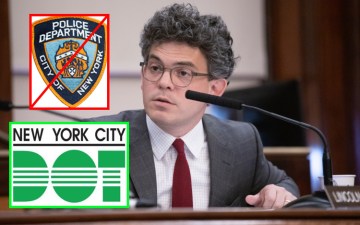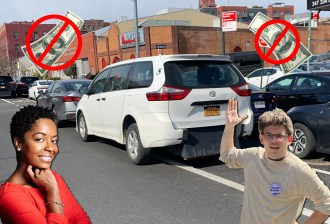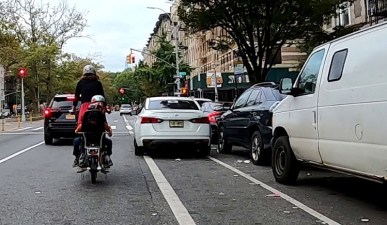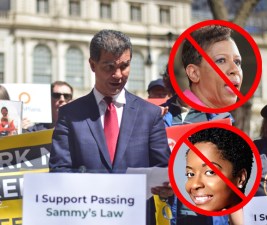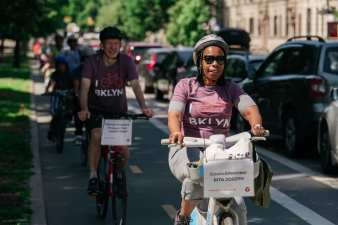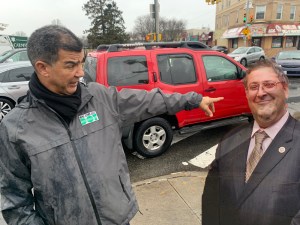UPDATE: Restler Bill to Allow Residents to Ticket Dangerous Drivers Gaining Steam
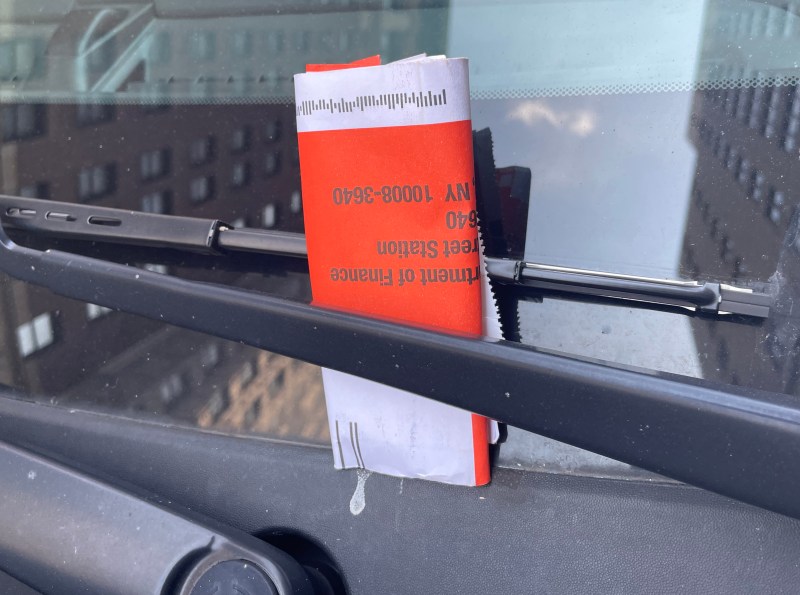
We all know that Billy Never Idles — but maybe soon, the city will be saying Mary-Louise Never Parkers.
A City Council bill that advocates believe will unleash a nicely remunerated civilian army against drivers who recklessly block roadways and bike lanes is looking likely to move ahead.
The bill’s sponsor, Council Member Lincoln Restler said Transportation Committee Chair Selvena Brooks-Powers is actively engaged in tweaking the bill, which currently only has 24 sponsors in the 51-person Council — most notably excluding Brooks-Powers and Speaker Adrienne Adams.
The bill would do two things: create a new, $175 ticket for “hazardous obstruction by a vehicle of a bicycle lane, bus lane, … sidewalk, crosswalk, or fire hydrant when such vehicle is located within a radial distance of 1,320 feet of a school building, entrance, or exit.” And it would, most important, require the Department of Transportation to create a protocol to allow civilians to “submit complaints and supporting evidence for alleged violations,” much as they can under the city’s anti-idling law.
Any resulting ticket would kick back 25 percent — or almost $44 — to the person who filed the complaint. The bill is seen as a vast improvement on the current system, which allows residents to report illegally parked cars to the NYPD through 311, but rarely results in any action taken, let alone a financial reward to the tipster, and can often result in complainants being harassed by cops or those allegedly tipped off by cops.
Opponents — including the NYPD and the DOT — claim such a scheme would set neighbor against neighbor, both agencies testified when a previous version of the concept, then-pushed by Restler’s predecessor Steve Levin, was making its way through the Council.
“Selvena and I met and she offered insightful and thoughtful feedback on the bill,” Restler told Streetsblog on Friday. “She certainly understands the value of the bill. And I’m hopeful that we can figure out a path forward.”
Exciting news from @CMBrooksPowers’ Policy Director:
“I can't confirm a date yet, but [CM Brooks-Powers] and the sponsor of the [Intro 501] bill [@LincolnRestler] are in conversation about scheduling a hearing soon…”
We can’t wait on action on this ?/?/ ?/?-promoting bill!
— NYC Climate Package (@ClimatePackage) November 2, 2022
Restler said Brooks-Powers’s suggestions will make the bill better, not water it down or make it needlessly complicated so that it won’t be implemented.
“She’s offered smart suggestions to to make it a better bill,” Restler said, citing ways to avoid the main complaint of the idling program — namely that “the process to submit complaints is so cumbersome that it discourages New Yorkers from participating.”
“So we’re looking to create a smarter system,” Restler said. “What matters is that we take the time to figure out the right policy solutions, and chart a path forward as swiftly as we can.”
The timeline appears to be early next year, Restler said, because the Council’s staff would need to be involved in dotting all the i’s — just as it took months for the Council to finalize a bill by the Council Member Brad Lander that sought to allow the city to tow away the cars of drivers who repeatedly got speed-camera tickets. The resulting bill passed as the Dangerous Vehicle Abatement Act, but only after drivers were allowed the option of taking a safety course and also given due process to fight the towing — changes that some say watered down the bill’s effectiveness.
That could happen here, if Restler, Brooks-Powers and the Council staff isn’t careful, said one expert, who pointed out that there’s a reason why the idling law covers only commercial vehicles.
“It does that, candidly, because their company name, address and info is printed on the side of their truck or van,” said Jeff Novich, who created the Reported app, which makes it easy to submit complaints of driver malfeasance (the Taxi and Limousine Commission and Department of Environmental Protection welcome complaints; the DOT and NYPD don’t). “So in those cases, the summons is routed to the company, not the individual, and it’s a key reason why that idling law does not include personal vehicles. We can’t submit an idling complaint against all the double parked people during ASP because the database that ties a license plate to a person or that home address is a restricted database that only the DMV and police have access to.
“I am very curious to see how they’ll get around this,” Novich added.
Like Restler, Novich also pointed out that the process to make an idling complaint with the DEP is complicated and puts a great deal of burden on the person simply hoping to clean the air by holding polluters accountable. He suggested that the TLC’s model works better because, well, that agency works well with Reported.
“Eighty five percent of submissions that Reported routed to TLC ended with a summons,” Novich said, citing Reported’s easy interface and ability to quickly upload pictures of the alleged reckless driving. But when people use Reported to simply send a 311 complaint to the NYPD for bike or bus lane blocking or some other vehicular malfeasance, less than 1 percent of those submissions end in an NYPD summons. (Streetsblog reported last year on the NYPD’s poor response to 311 service requests about driver misconduct.)
Brooks-Powers did not respond to two requests for comment on the nature of her discussions with Restler over the civilian reporting bill. Mayoral spokesman Charles Lutvak distanced the Adams City Hall from the West Wing’s previous blanket dismissal, saying, “Bike and bus lanes should be reserved for bikes and buses. We are reviewing this legislation.”
Advocates see the bill as so crucial because the NYPD writes so few tickets against drivers who block bus lanes, which delays thousands of commuters every day, or bike lanes, which endangers cyclists, who are often pushed into traffic from painted lanes — just as Madison Lyden was a split-second before she was hit and killed by a truck driver in 2018. Members of the public can easily report recklessly parking cab drivers through the Reported app, which frequently leads to fines issued by the Taxi and Limousine Commission. But none of the resulting revenue gets kicked back to the street-safety motivated complainant.
Bus and bike lane blocking is a rampant problem in New York, yet the NYPD is writing fewer and fewer tickets for both violations. Except for a peak between July 1, 2019 and June 30, 2020, bus and bike lane tickets have never exceeded one ticket per precinct every other day on average:
Source: NYC Open Data
It’s not the first time Restler has taken a stance against reckless drivers who either park illegally or are encouraged to drive by abusing their placards. During his campaign for his Williamsburg-Downtown Brooklyn seat last year, Restler said he would push to eliminate all placards, though it is unclear if the resulting bill will move forward. It has just 11 sponsors — all of whom represent districts with very low car ownership rates.
